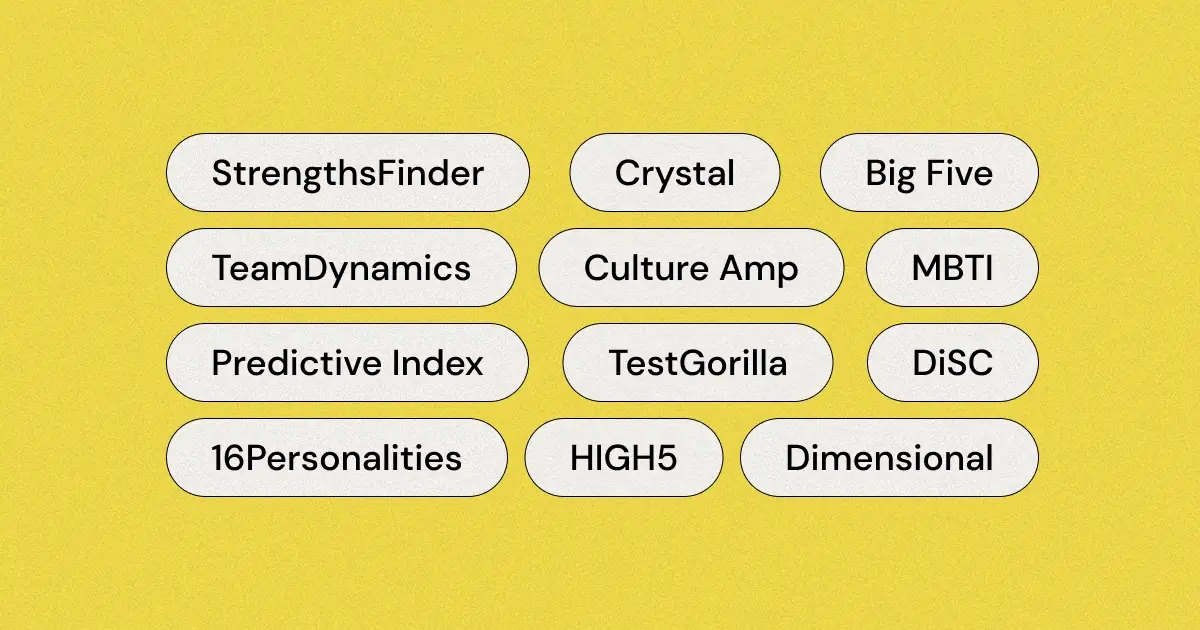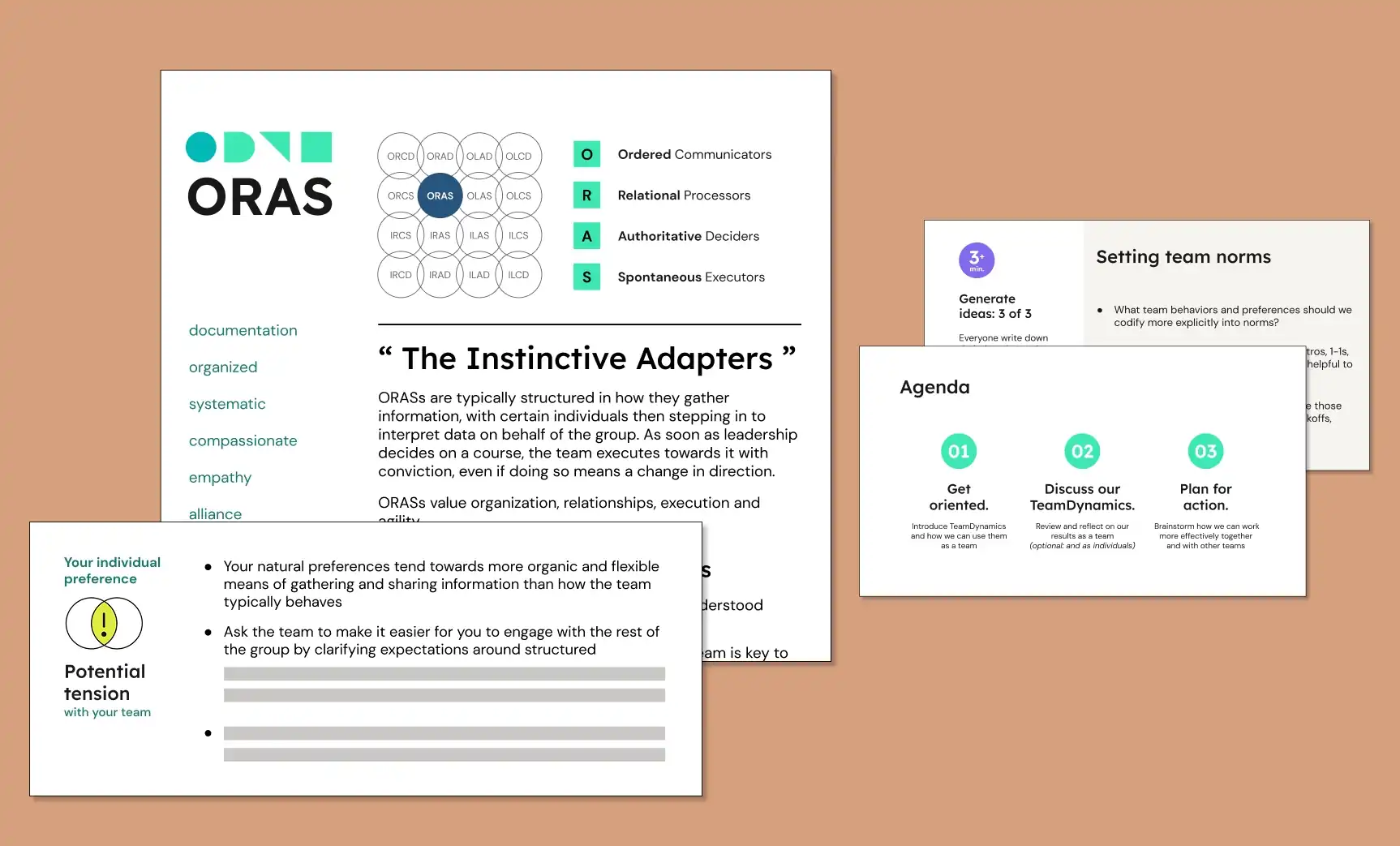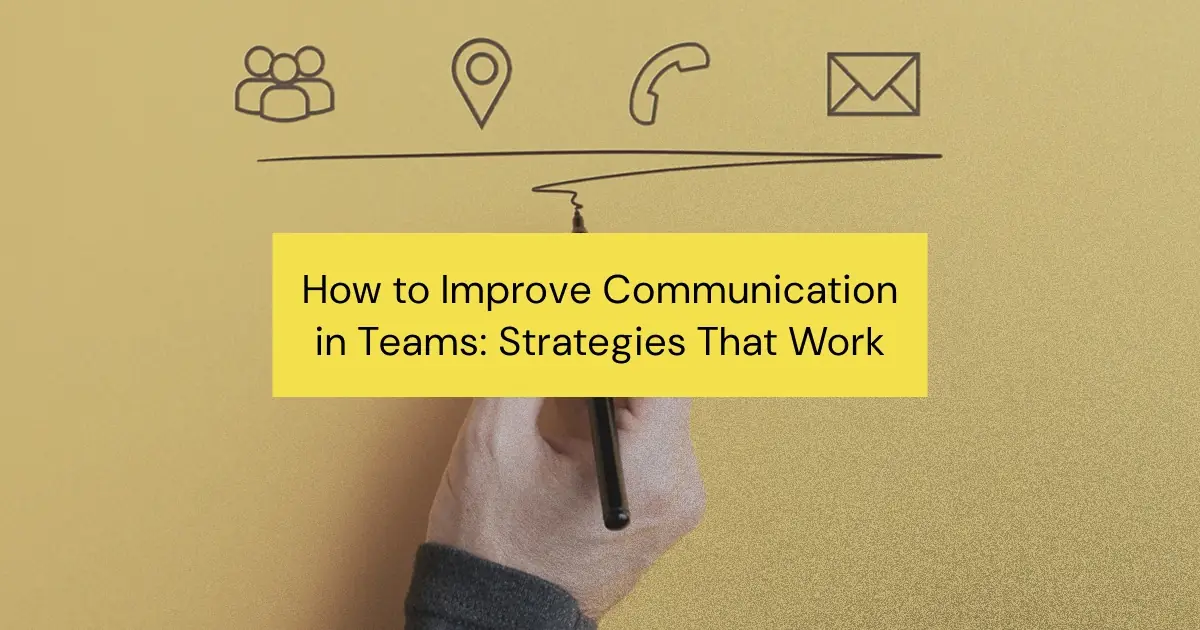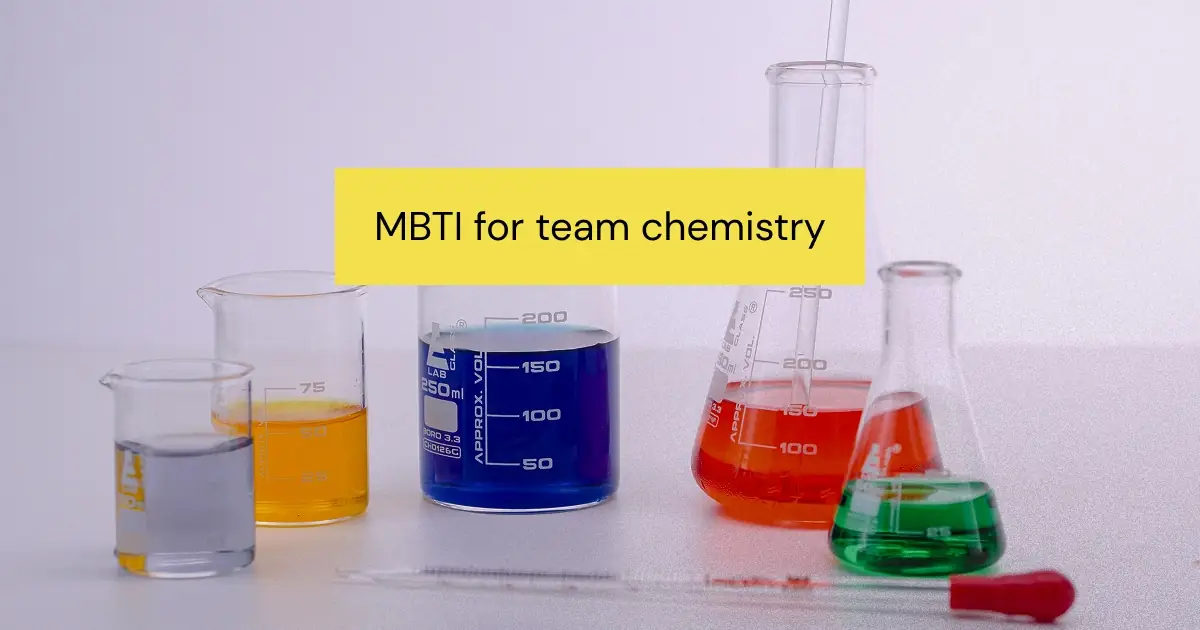In the competitive world of professional teams, using the right tools can make all the difference. Whether you’re looking to hire the best talent, build stronger teams, or understand your team members’ strengths, the right team building assessment tool can provide invaluable insights. But with so many options available, how do you choose the best assessment tool for team building?
In this guide, we’ll explore the best assessment tools for team building in 2025. We’ll cover top choices for hiring, team development, and understanding individual motivations. From well-known tools like the Predictive Index and StrengthsFinder to innovative options like Dimensional and Crystal, you’ll learn what each tool offers, how they stand out, and where they might fall short.
While these tools each bring something unique to the table, not all of them will fully meet your team’s needs. That’s why we’ll also introduce you to TeamDynamics, a comprehensive tool designed specifically for professional environments, making it the best choice for building strong, cohesive teams.
Best Assessment Tools for Hiring: Finding the Right Fit for Your Team
Hiring the right people is one of the most crucial steps in building a successful team. The right assessment tools can help you look beyond resumes and interviews, giving you deeper insights into a candidate’s potential fit within your organization. In this section, we’ll explore the best assessment tools for hiring that can streamline your recruitment process and help you make more informed decisions.
We’ll take a closer look at two standout tools: Predictive Index and TestGorilla. Both are designed to help you identify candidates who not only have the necessary skills but also align with your team’s culture and values. These tools offer a data-driven approach to hiring, making it easier to predict how a candidate will perform and fit into your team.
Let’s explore how these tools can elevate your hiring process and ensure you bring the best talent on board.
#1. Predictive Index
Best for: Data-Driven Hiring Insights
The Predictive Index (PI) is a behavioral assessment tool designed to help organizations understand the personality traits and cognitive abilities of potential hires. It provides a comprehensive analysis of how candidates are likely to behave in a work environment, offering insights into their drives, needs, and behaviors.
What Makes Predictive Index Different:
The Predictive Index sets itself apart with its focus on behavioral data and its ability to predict how candidates will fit within specific roles and teams. Unlike some assessments that focus solely on personality, PI combines behavioral and cognitive assessments to give a more rounded view of a candidate’s potential. Its emphasis on data-driven decision-making makes it a popular choice for companies looking to refine their hiring process.
Why Predictive Index is Useful for Hiring:
For hiring, the Predictive Index offers a structured approach to understanding how well a candidate’s natural behaviors align with the demands of the role. By using PI, hiring managers can reduce the guesswork involved in recruitment, making more informed decisions about which candidates are likely to thrive in their specific work environment. However, while PI is strong in predicting individual behavior, it may not fully account for how a candidate will interact within the dynamics of an existing team, which is crucial for building a cohesive group. Click here for the best alternatives to Predictive Index.
#2. TestGorilla
Best for: Streamlining the Hiring Process with Skill-Based Assessments
TestGorilla is an online assessment platform that provides a wide range of pre-employment tests designed to evaluate candidates on various skills, from cognitive abilities to job-specific skills. It offers a customizable suite of assessments that can be tailored to the specific needs of a role, helping employers make data-driven hiring decisions.
What Makes TestGorilla Different:
What sets TestGorilla apart is its focus on practical, skill-based testing rather than just personality or behavioral traits. The platform offers over 200 different assessments, including coding tests, language proficiency, and cognitive ability evaluations, allowing employers to assess a candidate’s direct fit for a particular role. Its user-friendly interface and the ability to integrate with popular applicant tracking systems (ATS) make it a convenient choice for streamlining the hiring process.
Why TestGorilla is Useful for Hiring:
TestGorilla is particularly useful for hiring because it allows employers to assess candidates on the specific skills that matter most for a given position. This helps in filtering out unqualified applicants early in the process, saving time and resources. However, while TestGorilla excels in evaluating technical and job-specific skills, it may fall short in assessing how a candidate’s personality and behavioral traits align with team dynamics, which can be crucial for long-term success within a team environment.
Best Assessment Tools for Team Building: Strengthening Your Team from Within
Building a strong, cohesive team goes beyond just hiring the right people. It requires ongoing development, understanding, and alignment among team members. The best assessment tools for team building help you uncover the dynamics within your team, identify areas for growth, and foster a culture of collaboration and trust.
In this section, we’ll dive into two top tools for team building: TeamDynamics and Culture Amp. These tools are designed to give you a comprehensive view of your team’s strengths, challenges, and overall dynamics. Whether you’re looking to enhance communication, boost morale, or align your team with your organization’s goals, these tools provide the insights you need to build a high-performing team.
Let’s explore how these assessment tools can help you take your team’s performance to the next level.
#3. TeamDynamics
Best for: Building High-Performing Teams
TeamDynamics is a comprehensive assessment tool designed specifically to help leaders understand and improve how their teams work together. Unlike tools that focus solely on individual traits, TeamDynamics offers a deep dive into team dynamics, providing insights into both individual behaviors and how those behaviors interact within the team.
What Makes TeamDynamics Different:
What sets TeamDynamics apart from other assessment tools is its focus on the collective dynamics of a team. While many tools assess individual strengths or personality traits, TeamDynamics zeroes in on how these individual characteristics influence and shape team performance. It provides actionable insights for leaders to enhance teamwork, resolve conflicts, and build stronger, more cohesive teams. Additionally, it helps individuals understand how they fit into their team, fostering a sense of belonging and boosting productivity.
Why TeamDynamics is Useful for Team Building:
TeamDynamics is particularly useful for team building because it’s designed to optimize how teams function as a whole. By providing leaders with a clear picture of their team’s dynamics, it empowers them to make informed decisions that improve collaboration and efficiency. For team members, it offers valuable insights into how they can better relate to and work with their colleagues, leading to more effective teamwork and a more enjoyable work environment. Trusted by high-performing organizations across various industries, TeamDynamics is also cost-effective, making it accessible to teams of all sizes.
{{inline-cta}}
#4. Culture Amp
Best for: Building Stronger Teams Through Employee Feedback
Culture Amp is an employee experience platform that focuses on gathering and analyzing feedback from team members to help organizations improve their workplace culture. It offers tools for employee engagement, performance management, and development, all aimed at fostering a positive and productive work environment.
What Makes Culture Amp Different:
Culture Amp stands out because of its emphasis on continuous feedback and its data-driven approach to understanding employee sentiment. Unlike traditional assessment tools that focus on individual traits, Culture Amp provides a broader view of the overall team and organizational culture. It offers customizable surveys and analytics that help leaders identify areas for improvement, track progress over time, and make informed decisions to enhance team dynamics and engagement.
Why Culture Amp is Useful for Team Building and Culture:
Culture Amp is particularly useful for team building because it helps leaders understand the collective pulse of their teams. By regularly gathering feedback, it enables managers to address issues before they become significant problems and to create a more supportive and aligned work environment. However, while Culture Amp excels in providing insights into team sentiment and culture, it may not offer the depth needed to understand individual behavioral styles or how those styles interact within the team, which can be crucial for fine-tuning team dynamics.
Best Assessment Tools for Understanding Individual Strengths: Unlocking Your Team’s Full Potential
Every team is made up of individuals with unique strengths and abilities. Understanding these strengths is key to maximizing each team member’s contribution and fostering a more productive and harmonious work environment. The best assessment tools for understanding individual strengths allow you to identify and leverage these abilities, helping each team member to shine in their role.
In this section, we’ll delve into two powerful tools: StrengthsFinder (also known as CliftonStrengths) and the DiSC profile. These tools are designed to give you deep insights into the strengths and working styles of your team members, enabling you to align their roles with their natural talents. By understanding what makes each person tick, you can create a more engaged, motivated, and effective team.
Let’s explore how these tools can help you unlock the full potential of each individual on your team.
#5. StrengthsFinder (CliftonStrengths)
Best for: Identifying What Your Team Members Do Best
StrengthsFinder, now known as CliftonStrengths, is a widely used assessment tool that helps individuals identify their top talents and strengths. Developed by Gallup, this tool categorizes strengths into 34 distinct themes, offering a personalized profile that highlights what each person naturally excels at.
What Makes StrengthsFinder Different:
What sets StrengthsFinder apart from other assessment tools is its singular focus on strengths rather than weaknesses. Unlike many assessments that aim to provide a balanced view of a person’s traits, StrengthsFinder zeroes in on what individuals do best. This strengths-based approach encourages people to develop their natural talents, leading to higher engagement and productivity.
Why StrengthsFinder is Useful for Understanding Individual Team Members’ Strengths:
StrengthsFinder is particularly useful for understanding individual team members because it provides clear insights into what drives each person and where they are likely to make their biggest contributions. By focusing on strengths, managers can better align tasks and roles with what each team member is naturally good at, leading to a more efficient and satisfied team. However, while StrengthsFinder is excellent for individual development, it may not fully address how these strengths interact within a team context, which is crucial for optimizing overall team performance. Learn about the best StrengthsFinder alternatives.
#6. DiSC Profile
Best for: Understanding Behavioral Styles to Enhance Team Collaboration
The DiSC profile is a personality assessment tool that categorizes individuals into four primary behavioral styles: Dominance, Influence, Steadiness, and Conscientiousness. By understanding where team members fall within these categories, the DiSC profile helps improve communication, teamwork, and overall effectiveness within a group.
What Makes DiSC Different:
What sets DiSC apart from other assessment tools is its focus on behavioral styles rather than personality traits or strengths alone. DiSC emphasizes how individuals prefer to interact with others and approach tasks, making it a practical tool for improving interpersonal dynamics within teams. The simplicity and ease of understanding the four styles make it accessible and straightforward to implement in a variety of settings.
Why DiSC is Useful for Understanding Individual Team Members’ Strengths:
DiSC is particularly useful for understanding how team members’ behavioral styles influence their interactions, communication, and approach to work. By identifying these styles, managers can tailor their leadership strategies to better suit each team member, fostering a more harmonious and productive work environment. However, while DiSC provides valuable insights into individual behavior, it may not delve as deeply into specific strengths or how these behaviors contribute to overall team performance, leaving some gaps in fully optimizing team dynamics. Learn about the best DiSC profile alternatives.
Best Assessment Tools for Understanding Team Member Motivations: What Drives Your Team
Understanding what motivates each team member is crucial for creating an environment where everyone feels engaged and driven to perform their best. The best assessment tools for understanding motivations help you tap into the underlying preferences, values, and personality traits that influence how your team members approach their work.
In this section, we’ll explore two of the most popular tools for uncovering these motivations: MBTI and the Big Five. These assessments provide valuable insights into the psychological factors that drive behavior, helping you to understand why your team members act the way they do and how you can better support their growth and satisfaction.
Let’s dive into how these tools can help you better understand what motivates your team and how to harness that knowledge for greater success.
#7. MBTI (Myers-Briggs Type Indicator)
Best for: Uncovering What Drives Your Team Members
The Myers-Briggs Type Indicator (MBTI) is one of the most well-known personality assessments in the world. It categorizes individuals into 16 distinct personality types based on four dichotomies: Extraversion vs. Introversion, Sensing vs. Intuition, Thinking vs. Feeling, and Judging vs. Perceiving. The MBTI aims to help people understand their preferences in how they perceive the world and make decisions.
What Makes MBTI Different:
What sets MBTI apart from other assessment tools is its comprehensive approach to understanding personality. Rather than focusing solely on behavior or strengths, MBTI delves into the psychological preferences that drive individual actions and decisions. This makes it a powerful tool for gaining insight into what motivates team members and how they interact with their environment.
Why MBTI is Useful for Understanding Individual Team Members’ Motivations:
MBTI is particularly useful for understanding what motivates your team members because it provides a deep dive into their intrinsic preferences and decision-making processes. By knowing each team member’s MBTI type, managers can tailor their approach to better align with individual motivations, leading to increased engagement and satisfaction. However, while MBTI offers rich insights into personality, it may not fully capture how these motivations translate into team dynamics, potentially overlooking key aspects of how individuals work together in a group setting. Learn about the best MBTI alternatives.
#8. Big Five Personality Traits
Best for: A Comprehensive View of What Drives Your Team
The Big Five Personality Traits, also known as the Five-Factor Model, is a psychological assessment that measures five core dimensions of personality: Openness, Conscientiousness, Extraversion, Agreeableness, and Neuroticism. This model is widely regarded as one of the most scientifically validated frameworks for understanding personality.
What Makes Big Five Different:
What sets the Big Five apart from other assessment tools is its empirical foundation and its ability to provide a nuanced, multidimensional view of personality. Unlike more simplified models, the Big Five captures a wide range of human behavior and emotional patterns, offering a more comprehensive understanding of what drives individuals. This tool is especially valued in academic and research settings for its reliability and validity.
Why Big Five is Useful for Understanding Individual Team Members’ Motivations:
The Big Five is particularly useful for understanding team members’ motivations because it gives a detailed and balanced view of their personality traits. By assessing where each team member falls on the spectrum of these five traits, managers can gain insights into what motivates them, how they are likely to respond to different situations, and how they interact with others. However, while the Big Five provides a deep understanding of individual personalities, it may not offer specific guidance on how these traits interact within the team context, which can be essential for building cohesive and effective teams. Learn about the best Big Five alternatives.
Best Free Assessment Tools for Team Building: Cost-Effective Insights for Your Team
Building a strong team doesn’t always require a big budget. Free assessment tools can provide valuable insights into your team’s dynamics, strengths, and personalities without costing a dime. These tools are a great starting point for understanding your team and identifying areas for growth, especially if you’re working with limited resources.
In this section, we’ll take a closer look at two of the best free assessment tools for team building: 16Personalities and HIGH5. Both offer accessible and user-friendly ways to gain insights into your team’s individual traits and how they work together. While they may not offer the depth of some paid tools, they provide a solid foundation for team development.
Let’s explore how these free tools can help you begin the journey toward a more cohesive and effective team.
#9. HIGH5 Strengths Test
Best for: Discovering and Leveraging Your Team’s Natural Talents
The HIGH5 Strengths Test is a free online assessment designed to help individuals identify their top five strengths. Inspired by the strengths-based philosophy, the test aims to empower people by highlighting what they naturally do well. It provides personalized reports that detail each of the five strengths, offering practical advice on how to use these strengths in daily life and work.
What Makes HIGH5 Strengths Test Different:
What makes the HIGH5 Strengths Test stand out is its specific focus on positive psychology and its completely free access. Unlike many other strengths assessments that require payment for detailed reports, HIGH5 delivers actionable insights at no cost. It’s particularly geared toward individuals and teams looking to harness their innate abilities without the barriers of financial commitment.
Why HIGH5 Strengths Test is Useful as a Free Team Building Assessment Tool:
As a free team-building tool, the HIGH5 Strengths Test is valuable because it encourages team members to focus on their strengths, promoting a positive and strengths-based culture within the team. It’s easy to administer and can quickly give teams a shared language around strengths, which can enhance collaboration and morale. However, while the HIGH5 Strengths Test offers useful insights, it may not provide the depth or comprehensive analysis needed for more complex team-building initiatives, especially in professional environments where understanding how strengths interact within a team is critical. Learn about the best HIGH5 Strengths Test alternatives.
#10. 16Personalities
Best for: Accessible Insights for Team Building
16Personalities is a popular online personality assessment that categorizes individuals into 16 distinct personality types, based on the Myers-Briggs Type Indicator (MBTI) framework. The assessment is widely used due to its ease of access, simplicity, and engaging presentation of results, making it a favorite among individuals and teams looking for a quick understanding of personality dynamics.
What Makes 16Personalities Different:
What sets 16Personalities apart from other assessment tools is its accessibility and user-friendly approach. The test is free, easy to take, and provides detailed descriptions of each personality type, complete with insights into strengths, weaknesses, and preferred working styles. The platform’s visually appealing and straightforward reports make it an attractive option for those new to personality assessments or looking for an introduction without the need for a financial investment.
Why 16Personalities is Useful as a Free Team Building Assessment Tool:
As a free team-building tool, 16Personalities is useful because it provides immediate, easy-to-understand insights into the personalities within your team. It can serve as a starting point for discussions about how different team members might work together and where potential conflicts could arise. However, while 16Personalities offers a broad overview of personality types, it may lack the depth and customization needed for more advanced team-building efforts, especially in a professional setting where a deeper understanding of team dynamics is crucial. Learn about the best 16Personalities alternatives.
Honorable Mentions: Other Tools to Consider
While we’ve covered some of the most well-known and widely used assessment tools for team building, there are a few innovative options that deserve special attention. These tools bring something unique to the table, offering fresh approaches to understanding and improving team dynamics.
In this section, we’ll highlight two interesting tools: Dimensional and Crystal. Dimensional is an iPhone app that brings the power of personality assessments to your fingertips, making it easy to gain insights on the go. Crystal, on the other hand, takes the DiSC profile to the next level by embedding it directly into your meeting workflows, helping you tailor your communication to each team member’s style.
Let’s take a closer look at how these tools can add value to your team-building efforts.
#11. Dimensional
Best for: Personality Insights at Your Fingertips
Dimensional is a modern personality assessment tool available as an iPhone app. It provides users with quick and engaging insights into their personality traits through a sleek and intuitive mobile interface. The app offers a range of assessments designed to help users understand their own behaviors, preferences, and how they interact with others.
What Makes Dimensional Different:
Dimensional sets itself apart from other assessment tools through its mobile-first approach and visually appealing user interface. Unlike traditional assessments that are often web-based or paper-based, Dimensional is designed to be used on the go, making it more accessible and convenient. The app offers a wealth of content, including detailed personality profiles, tips for personal growth, and suggestions for improving interactions with others, all within an easy-to-navigate platform.
Why Dimensional is Innovative:
Dimensional is innovative because it combines functionality with an attractive design, providing a modern, enjoyable user experience. The app’s pretty interface and wealth of content make it a compelling choice for individuals looking to explore their personality on the go. However, it’s important to note that Dimensional focuses solely on individual traits and doesn’t capture the critical nuances of how these traits play out in a team-based setting. For those seeking to understand and improve team dynamics, Dimensional may not be the best choice, as it lacks the depth needed to assess how individuals interact within a team environment. Learn about the best Dimensional alternatives.
#12. Crystal
Best for: Personalized Interaction Insights for Every Meeting
Crystal is a unique personality assessment tool that integrates DiSC-based personality insights directly into your everyday workflows. Designed to help professionals tailor their communication and interactions, Crystal provides detailed personality profiles that can be used to better understand colleagues, clients, and prospects, making it especially valuable for sales teams and those in client-facing roles. Learn more about the best Crystal alternatives.
What Makes Crystal Different:
What sets Crystal apart from other assessment tools is its seamless integration into meeting workflows. By embedding personality insights directly into platforms like LinkedIn, email, and CRM systems, Crystal offers real-time guidance on how to best approach and communicate with others. This makes it a practical tool for anyone who needs to adapt their style to better connect with different personalities on the fly.
Why Crystal is Innovative:
Crystal’s innovation lies in its ability to provide actionable personality insights at the exact moment they’re needed, making it a powerful tool for sales professionals and others who rely on effective communication. By leveraging DiSC-based profiles, Crystal helps users understand the preferences and tendencies of those they interact with, enhancing the effectiveness of meetings and pitches. However, it’s important to note that Crystal focuses on individual personality traits, which means it doesn’t capture the broader team-wide dynamics that are crucial for effective team building. While it’s excellent for one-on-one interactions, it may fall short when trying to understand and optimize the collective behavior of a team.
Choosing the Right Team Building Assessment Tool for Your Team
Selecting the right assessment tool is crucial for building strong, cohesive teams. Whether you’re focused on hiring, understanding individual strengths, or improving team dynamics, each tool we’ve explored offers unique benefits. The Predictive Index and TestGorilla provide powerful insights for hiring, while StrengthsFinder and DiSC help you tap into individual strengths. Tools like MBTI and the Big Five offer deep dives into what motivates your team members, and free options like 16Personalities and HIGH5 give you a starting point without the financial commitment. Innovative tools like Dimensional and Crystal bring modern solutions to the table, enhancing individual understanding and communication.
However, while each of these tools has its strengths, they often focus on just one aspect of team dynamics—whether it’s understanding individual traits, motivations, or behaviors. This can leave gaps in fully capturing the complex interactions that make or break a team’s success.
That’s where TeamDynamics comes in. Unlike other tools, TeamDynamics is designed to evaluate not just individual behaviors, but how those behaviors interact within the team as a whole. It provides a comprehensive view of your team’s dynamics, helping you identify alignment, potential conflicts, and opportunities for growth. By understanding both individual preferences and collective team norms, TeamDynamics empowers you to build a more cohesive, productive, and successful team.
In the end, the best assessment tool is the one that meets all your needs, both now and as your team evolves. For teams looking to go beyond surface-level insights and truly understand how to thrive together, TeamDynamics is the clear choice. Try TeamDynamics for free and see if it's right for you and your team.


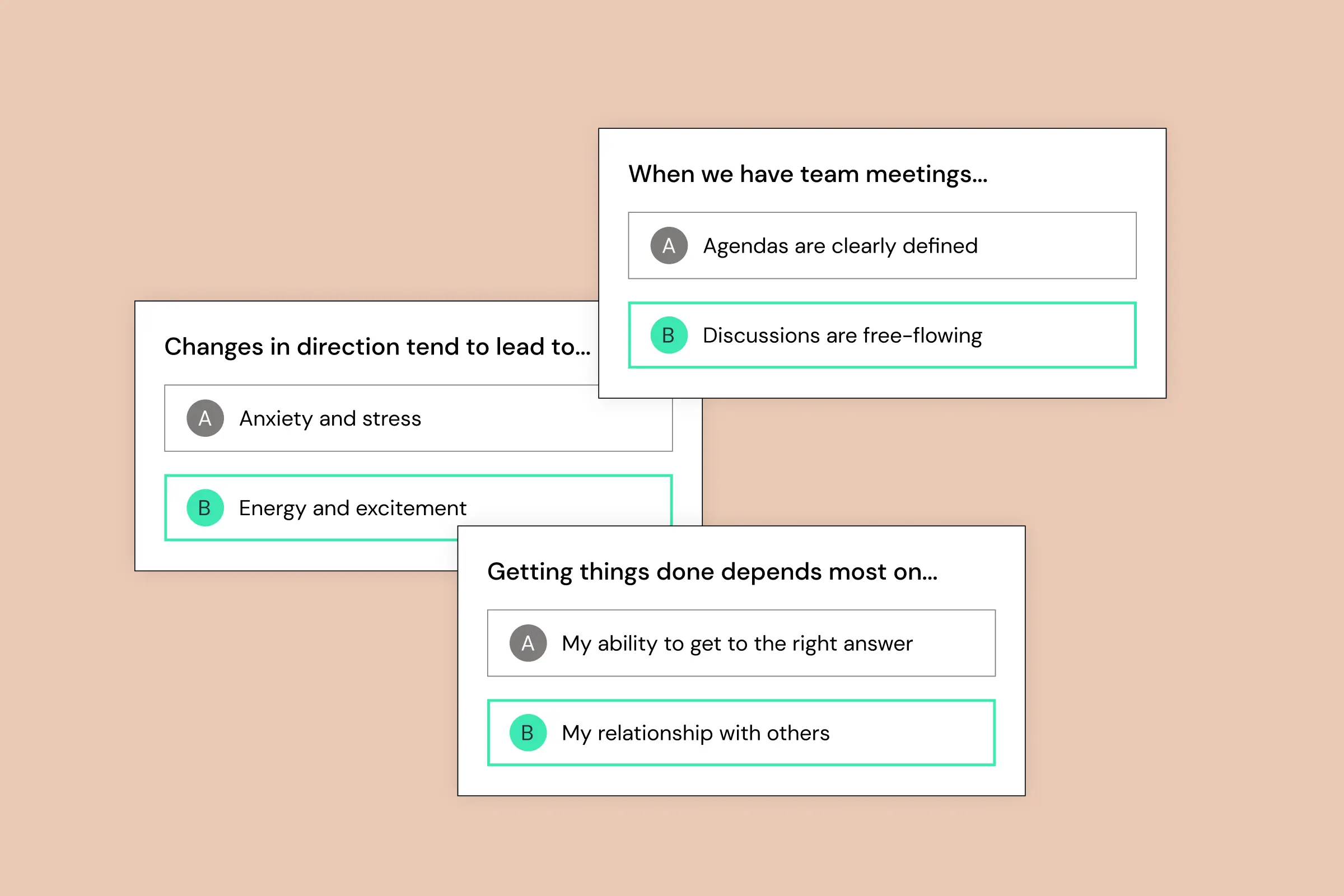

.png)
